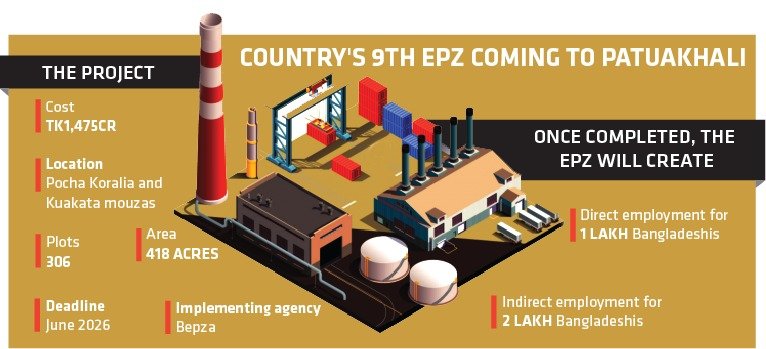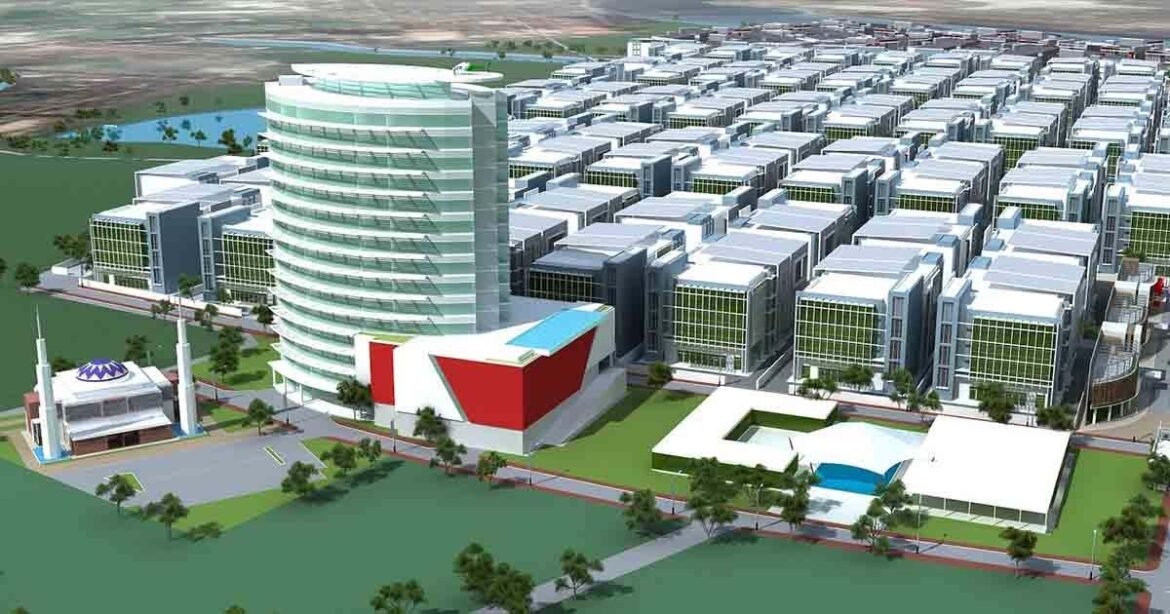The proposed EPZ in Patuakhali will be strategically located near seaports and benefit from improved connectivity.
The Bangladesh government is taking measures to establish the ninth Export Processing Zone (EPZ) in Patuakhali in an effort to attract foreign investment and increase exports. The completion of the proposed “Patuakhali Export Processing Zone,” which will include 411 acres of land in the Auliapur Union of Sadar Upazila and seven acres of land in Kuakata, is expected by 2026. The Bangladesh Export Processing Zone Authority (BEPZA) has already submitted a project proposal with an estimated price of Tk 14.75 billion.
You can also read: Bangladesh’s merchandise exports to the UK reaches a historic $5 billion
The establishment of the Patuakhali EPZ is the outcome of discussions with foreign corporations operating in other EPZs in Bangladesh who have expressed interest in investing in the area if the proper infrastructure is in place.
Advantageous location and connectivity
The proposed EPZ will be strategically located close to the Payra and Mongla seaports, facilitating the transport of goods. The opening of the Padma Bridge has also improved road connectivity in the region, and plans are ongoing to improve rail connectivity. It is projected that these factors will attract foreign investment and facilitate the operation of export-oriented factories within the EPZ.
“There are two seaports – Payra and Mongla – near the proposed EPZ. After the launch of the Padma Bridge, Mongla has become a top investment destination. We have started talking to investors about an EPZ in the Barishal zone and they have verbally expressed their interest in investing in that area,” said Nazma Binte Alamgir, executive director (Public Relations) at Bepza.

Progress and financing of the proposed EPZ in Patuakhali
BEPZA has already presented the primary proposal to the Planning Commission, and it will shortly be presented to the Primary Evaluation Committee of the Industrial Power Division.
“After the committee approves the proposal, it will be presented to the Executive Committee of the National Economic Council. We want to get the construction work started this year after getting the greenlight,” said Nazma.
BEPZA will contribute Tk 3.38 billion to the initiative, while the government will provide the remaining Tk 11.37 billion in loans. According to the concerned officials, the project’s expenses will be financed with a loan from the government at 2% interest.
Under the terms of the project, eco-friendly industrial sites will be established for investors, along with all other essential amenities.
Boosting employment and other opportunities
The project aims to establish 306 industrial plots and employment opportunities for nearly 100,000 people in Patuakhali’s riverine regions. Moreover, the Patuakhali EPZ project is anticipated in creating indirect employment for another 200,000 people. BEPZA intends to invest $1.5 billion and export $1.84 billion worth of goods annually from the EPZ.
The project seeks to stimulate economic growth in the region, boost living standards, and contribute to Bangladesh’s overall development.

Expanding EPZ networks and its impact
The EPZ initiative in Bangladesh has been effective in attracting foreign investments and fostering export growth. There are currently eight EPZs in the country, all of which were established by Bepza, which was founded in 1980. The agency, which operates under the Office of the Prime Minister, administers all EPZs in the country.
The first EPZ was established by Bepza in Chattogram. The Dhaka EPZ was established in 1993, and the Dhaka EPZ expansion initiative was initiated in 1997, following positive feedback from potential investors.
EPZs were subsequently established in Mongla, Cumilla, Ishwardi, and Uttara (Nilphamari). Two more EPZs were established in the districts of Adamjee Jute Mills and Chittagong Steel Mills.
The majority of EPZs were established near seaports to facilitate the exportation of goods, as the majority of goods are exported directly. These EPZs have played an important role in the production of export products worth over $9.58 billion per year and in the employment of over five lakh skilled workers.
Around the country’s numerous EPZs, satellite communities have developed automatically. Aside from this, industrial factories, and other industries including transportation, food supply, markets, educational institutions, and hospitals, have been developed around the EPZs.
To conclude, the government’s plan to establish EPZ in Patuakhali demonstrates its ongoing commitment to encouraging industrial growth, attracting foreign investment, and expanding export opportunities. With its strategic location, enhanced connectivity, and business-friendly environment, the Patuakhali EPZ is poised to contribute to Bangladesh’s economic growth and generate thousands of employment opportunities.


